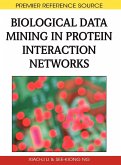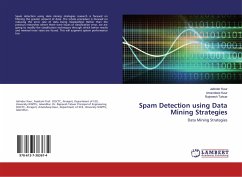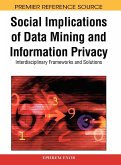Networks Attack Detection on 5G Networks using Data Mining Techniques
Herausgeber: Pande, Sagar Dhanraj; Khamparia, Aditya
Networks Attack Detection on 5G Networks using Data Mining Techniques
Herausgeber: Pande, Sagar Dhanraj; Khamparia, Aditya
- Gebundenes Buch
- Merkliste
- Auf die Merkliste
- Bewerten Bewerten
- Teilen
- Produkt teilen
- Produkterinnerung
- Produkterinnerung
This book will look at cutting-edge Network Attacks and Security solutions that employ intelligent data processing and Machine Learning (ML) methods.
Andere Kunden interessierten sich auch für
![Biological Data Mining in Protein Interaction Networks Biological Data Mining in Protein Interaction Networks]() Biological Data Mining in Protein Interaction Networks207,99 €
Biological Data Mining in Protein Interaction Networks207,99 €![Spam Detection using Data Mining Strategies Spam Detection using Data Mining Strategies]() Jatinder KaurSpam Detection using Data Mining Strategies24,99 €
Jatinder KaurSpam Detection using Data Mining Strategies24,99 €![Social Big Data Mining Social Big Data Mining]() Hiroshi IshikawaSocial Big Data Mining135,99 €
Hiroshi IshikawaSocial Big Data Mining135,99 €![Social Implications of Data Mining and Information Privacy Social Implications of Data Mining and Information Privacy]() Social Implications of Data Mining and Information Privacy179,99 €
Social Implications of Data Mining and Information Privacy179,99 €![Portable Heart Attack Monitoring System with Dedicated Optical Network Portable Heart Attack Monitoring System with Dedicated Optical Network]() Saad IdreesPortable Heart Attack Monitoring System with Dedicated Optical Network32,99 €
Saad IdreesPortable Heart Attack Monitoring System with Dedicated Optical Network32,99 €![Why Cryptography Should Not Rely on Physical Attack Complexity Why Cryptography Should Not Rely on Physical Attack Complexity]() Juliane KrämerWhy Cryptography Should Not Rely on Physical Attack Complexity75,99 €
Juliane KrämerWhy Cryptography Should Not Rely on Physical Attack Complexity75,99 €![Automatic Data Mining Using Speech Signals Automatic Data Mining Using Speech Signals]() Jagannath JadhavAutomatic Data Mining Using Speech Signals26,99 €
Jagannath JadhavAutomatic Data Mining Using Speech Signals26,99 €-
-
-
This book will look at cutting-edge Network Attacks and Security solutions that employ intelligent data processing and Machine Learning (ML) methods.
Produktdetails
- Produktdetails
- Verlag: CRC Press
- Seitenzahl: 218
- Erscheinungstermin: 23. April 2024
- Englisch
- Abmessung: 240mm x 161mm x 16mm
- Gewicht: 496g
- ISBN-13: 9781032530185
- ISBN-10: 1032530189
- Artikelnr.: 70102620
- Herstellerkennzeichnung
- Libri GmbH
- Europaallee 1
- 36244 Bad Hersfeld
- gpsr@libri.de
- Verlag: CRC Press
- Seitenzahl: 218
- Erscheinungstermin: 23. April 2024
- Englisch
- Abmessung: 240mm x 161mm x 16mm
- Gewicht: 496g
- ISBN-13: 9781032530185
- ISBN-10: 1032530189
- Artikelnr.: 70102620
- Herstellerkennzeichnung
- Libri GmbH
- Europaallee 1
- 36244 Bad Hersfeld
- gpsr@libri.de
Dr. Sagar Dhanraj Pande Assistant Professor, Department of Computer Science and Engineering, School of Engineering and Technology, Pimpri Chinchwad University (PCU), Pune, Maharashtra, India. Dr. Sagar Dhanraj Pande has expertise in Teaching, Innovation, Research & Development of more than 8 years. He has received his Ph.D. in Computer Science and Engineering from Lovely Professional University, Phagwara, Punjab, India in 2021. He was 2nd University Topper during his Master of Engineering in 2016 at Sant Gadge Baba Amravati University, Amravati, Maharashtra, India. He has been awarded with "BEST PAPER AWARD" in 2023 from International Knowledge Research Foundation in collaboration with Eminent College of Management and Technology (ECMT), West Bengal, India. He has received the "Young Researcher Award" and "Best Ph.D. Thesis Award" in 2022 from Universal Innovators, New Delhi, India. Also, he has received the "Emerging Scientist Award" in 2021 from VDGOOD Professional Association, Pondicherry, India. He has been Session Chair of Multiple International Conferences. His research interest is Deep Learning, Machine Learning, Network Attacks, Cyber Security, and the Internet of Medical Things (IoMT). He has published and presented more than 85 papers in IEEE, Springer, Elsevier, Taylor & Francis, and other reputable journals which are SCI, SCIE, Scopus indexed & peer-review journals. Also, he has published more than 48 Patents on the topics of Computer Vision, Natural Language Processing, Generative AI, IoT, and its applications. He is currently supervising 4 Ph. D Scholar in the domain of AIML. He has also supervised several postgraduate students in cybersecurity, computer networks, and AI. He is responsible for teaching Artificial Intelligence, Deep Learning, Machine Learning, Cyber Crime and Security, and Python Programming courses to undergraduate and post- graduate students. He is also sharing his knowledge through his YouTube channel named sdpguruj https://www.youtube.com/c/SDPGuruji/playlists. Dr. Aditya Khamparia Assistant Professor, Coordinator of Department of Computer Science, Babasaheb Bhimrao Ambedkar University, Satellite Centre, Amethi, India. Dr. Aditya Khamparia has expertise in Teaching, Entrepreneurship, and Research & Development of 8 years. He is currently working as Assistant Professor and Coordinator of Department of Computer Science, Babasaheb Bhimrao Ambedkar University, Satellite Centre, Amethi, India. He received his Ph.D. degree from Lovely Professional University, Punjab in May 2018. He has completed his M. Tech. from VIT University and B. Tech. from RGPV, Bhopal. He has completed his PDF from UNIFOR, Brazil. He has around 95 research papers along with book chapters including more than 15 papers in SCI indexed Journals with cumulative impact factor of above 50 to his credit. Additionally, He has authored, edited and editing 5 books. Furthermore, he has served the research field as a Keynote Speaker/Session Chair/Reviewer/TPC member/ Guest Editor and many more positions in various conferences and journals. His research interest includes machine learning, deep learning, educational technologies, computer vision.
1. Enhancing 5G and IoT Network Security: A Multi-Model Deep Learning
Approach for Attack Classification. 2. Dynamic Deployment and Traffic
Scheduling of UPF in 5G Networks. 3. Spatial Federated Learning and
Blockchain based 5G Communication Model for Hiding Confidential
Information. 4. Mining Intelligence Hierarchical Feature for Malware
Detection over 5G Network. 5. Enhancing Reliability and Security of Power
Monitoring Systems in the Era of 5G Networks. 6. Passive Voice in 5G Mobile
Edge Computing: Optimizing Energy Efficiency and Resource Utilization. 7.
Exchange Matching Algorithm for Low-Complexity Traffic Scheduling for 5G
Fronthaul Networks. 8. Attack Path Discovery in Dynamic Network
Environments for Automated Penetration Testing over 5G Networks. 9.
Enhancing Electric Vehicle Charging Efficiency in Urban Areas with 5G
Network Integration and Network Attack Mitigation. 10. Next-Generation
Intrusion Detection System for 5G Networks with Enhanced Security Using
Updated Datasets
Approach for Attack Classification. 2. Dynamic Deployment and Traffic
Scheduling of UPF in 5G Networks. 3. Spatial Federated Learning and
Blockchain based 5G Communication Model for Hiding Confidential
Information. 4. Mining Intelligence Hierarchical Feature for Malware
Detection over 5G Network. 5. Enhancing Reliability and Security of Power
Monitoring Systems in the Era of 5G Networks. 6. Passive Voice in 5G Mobile
Edge Computing: Optimizing Energy Efficiency and Resource Utilization. 7.
Exchange Matching Algorithm for Low-Complexity Traffic Scheduling for 5G
Fronthaul Networks. 8. Attack Path Discovery in Dynamic Network
Environments for Automated Penetration Testing over 5G Networks. 9.
Enhancing Electric Vehicle Charging Efficiency in Urban Areas with 5G
Network Integration and Network Attack Mitigation. 10. Next-Generation
Intrusion Detection System for 5G Networks with Enhanced Security Using
Updated Datasets
1. Enhancing 5G and IoT Network Security: A Multi-Model Deep Learning
Approach for Attack Classification. 2. Dynamic Deployment and Traffic
Scheduling of UPF in 5G Networks. 3. Spatial Federated Learning and
Blockchain based 5G Communication Model for Hiding Confidential
Information. 4. Mining Intelligence Hierarchical Feature for Malware
Detection over 5G Network. 5. Enhancing Reliability and Security of Power
Monitoring Systems in the Era of 5G Networks. 6. Passive Voice in 5G Mobile
Edge Computing: Optimizing Energy Efficiency and Resource Utilization. 7.
Exchange Matching Algorithm for Low-Complexity Traffic Scheduling for 5G
Fronthaul Networks. 8. Attack Path Discovery in Dynamic Network
Environments for Automated Penetration Testing over 5G Networks. 9.
Enhancing Electric Vehicle Charging Efficiency in Urban Areas with 5G
Network Integration and Network Attack Mitigation. 10. Next-Generation
Intrusion Detection System for 5G Networks with Enhanced Security Using
Updated Datasets
Approach for Attack Classification. 2. Dynamic Deployment and Traffic
Scheduling of UPF in 5G Networks. 3. Spatial Federated Learning and
Blockchain based 5G Communication Model for Hiding Confidential
Information. 4. Mining Intelligence Hierarchical Feature for Malware
Detection over 5G Network. 5. Enhancing Reliability and Security of Power
Monitoring Systems in the Era of 5G Networks. 6. Passive Voice in 5G Mobile
Edge Computing: Optimizing Energy Efficiency and Resource Utilization. 7.
Exchange Matching Algorithm for Low-Complexity Traffic Scheduling for 5G
Fronthaul Networks. 8. Attack Path Discovery in Dynamic Network
Environments for Automated Penetration Testing over 5G Networks. 9.
Enhancing Electric Vehicle Charging Efficiency in Urban Areas with 5G
Network Integration and Network Attack Mitigation. 10. Next-Generation
Intrusion Detection System for 5G Networks with Enhanced Security Using
Updated Datasets









